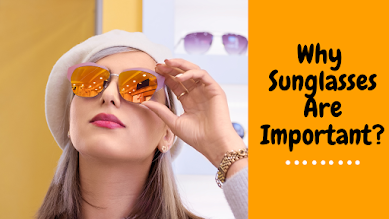The uses of sunglass is becoming more and more popular rapidly. For good reason. Sunglasses, with their multiple colors, shapes and materials, underline our character and help us enhance our personality. That is why they have become one of our favorite accessories.Also sunglasses are important for your eyes.
Style is not the only benefit that sunglass provide us. First of all, sunglasses have an immeasurable protective function against UV rays.
Sunglass protect us from different types of diseases and the best protection is they save us from the direct sun rays. You can use it for adults and children, whether in summer or winter or in rainy season!
Find out what are the characteristics of sunglasses that protect our eyes and why brand sunglasses are more expensive but also much more protective.
Sunlight can cause serious eye disease
As the name suggests, we wear sunglasses to protect ourselves from the sun and its ultraviolet radiation. Just as our skin needs to protect itself from excessive sun through the use of sunscreen and long clothing, our eyes also need to be protected.
If too much unfiltered sunlight reaches our eyes, especially at a young age, serious diseases can develop that can lead to complete blindness or even cancer.
- Waterfalls
It is the most common cause of vision loss in people over 40 and is also the leading cause of blindness worldwide. Also, with age, risk factors for cataracts include ultraviolet radiation. To prevent cataracts, you should wear sunglasses that block 100 percent of the sun's ultraviolet rays. However, the complete prevention of cataracts through sunglasses is not guaranteed, as the disease can also be triggered by physiological factors other than sun exposure.
- Macular degeneration
Macular degeneration occurs when the small central portion of the retina, called the macula, disappears. The retina is the light-sensitive nerve tissue which situated at the back end of the eye. It usually does not cause blindness, but it can cause serious vision problems. Several renowned studies have suggested that sun exposure may be a risk factor for macular degeneration and that the sensitivity of the skin to sunlight and the color of the iris play a central role in determining macular degeneration.
- Eye cancer
Cancer of the eye (ocular melanoma) develops in the pigment-producing cells that give the eyes their color. Exposure to ultraviolet light can increase the risk of conjunctival melanoma. This melanoma occurs on the surface of the eye.
Which type of glass can protect you from serious diseases caused by sun?
Not all sunglasses are equally effective. Whether they are old, cheap, expensive or tinted, they may or may not do their job to protect our eyes.
Most of today's sunglasses have UV protection embedded in the lens rather than covering it, and most big name brands include UV protection on their label. Look for a label that says "100% protection against UVA and UVB rays" or "100% protection against UV 400".
Glare from snow, sand, and wind cause painful eye irritation.
Most of our belive that sunglass only protect us from diseases, but there are a huge use of sunglass in the factories.
- Snow
Snow reflects 80% of the sun's ultraviolet rays and can cause a condition known as snow blindness, in which the glare from the sun actually burns the cornea (corneal flash burn). If you are skiing, snowboarding, or hiking in the snow (any time of year), wear sunglasses. Make sure they cover and protect the lower part of the eyes, due to the reflective nature of snow.
- Sand
- Wind
When you are recovering from a surgery your eyes needs a very special care
Some of us choose to undergo eye surgery to combat visual impairment, so that we can see without the aid of glasses or contact lenses. One operation that is frequently performed is LASIK. The correction is achieved with a special laser that reshapes the cornea in order to change the power of focus.
Over time, the eyes steadily improve. So it is possible to return to work a few days after the operation and return to daily routines. Patients may experience discomfort for the first few days, such as mild irritation and sensitivity to light, halos, glare, or glare in low-light settings.
In the vast majority of cases, these problems are temporary and disappear completely in three to six months. During this time, the eyes must be strictly protected from sunlight, dirt and climatic influences. The best way to do this is by wearing high-quality sunglasses.
Cheap, low-quality lenses hurt your eyes more than not wearing glasses.
Although sunglasses from the supermarket, clothing store, gas station, or beach vendor are very common and inexpensive, we strongly recommend not wearing these cheap lenses. Cheap sunglasses which are generally found in local market doest not provide enough sun protection.
The reason for this is simple: the dark lenses of any sunglasses, expensive or cheap, dilate our pupils. However, the dilation of our pupils can have serious consequences if dark lenses do not offer built-in UV protection. If you don’t wear sunglass the sun rays can penetrate the inside of the eye and can cause different kinds of diseases.
Therefore, always wear high-quality brand name sunglasses that have a label that guarantees 100% UVA and UVB protection.



0 Comments